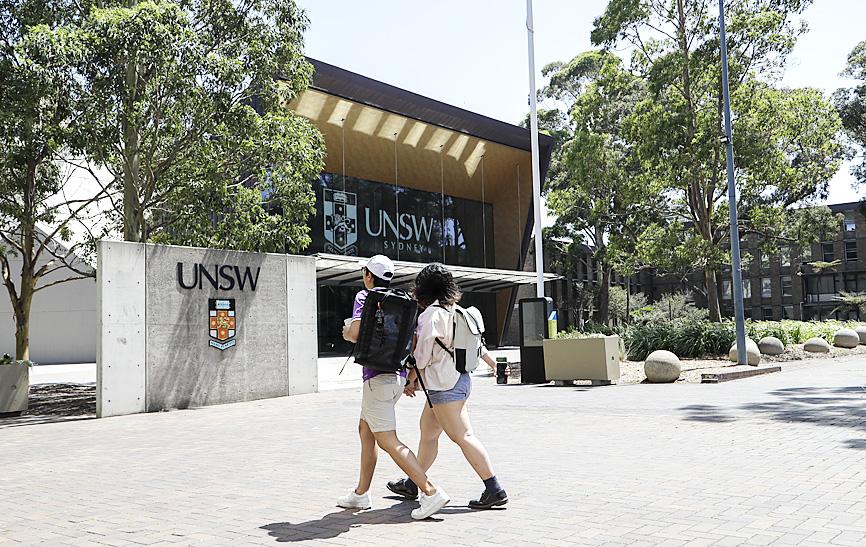Australia is to draw up a list of critical and emerging technologies that are subject to restrictions on foreign research collaboration, a parliament intelligence committee heard yesterday.
Security agencies already screen international collaboration on military or dual-use technologies from universities, but in a review led by the prime minister’s office and the Australian Department of Home Affairs, other emerging technologies that present an economic risk would be identified.
It was a departure from past practice that economic competition was being considered in a national interest assessment, Australian Security Intelligence Organisation (ASIO) Director-General Mike Burgess said.

Photo: AP
“Global circumstances are driving us in that direction, but that does not mean to say that we want to become totally protectionist as a nation,” he told the parliament’s intelligence and security committee.
The committee is holding an inquiry into national security risks to universities, and many submissions have focused on China, from where a large number of students come.
Hosting international students was important for Australia’s economy and for diversity of thought at universities, Burgess said.
ASIO investigated covert attempts by foreign states to obtain Australian intellectual property and the security agency had 60 interactions with universities last year, he said.
China had been open about its ambition in technology research and its Thousand Talents Program, to recruit people familiar with foreign technology and intellectual property, was “in of itself not concerning,” Burgess said.
“It is a natural extension of China’s strategic plan to become a world leader in technology, and secure their economic and military advantage,” he said.
In the US, several researchers at universities and NASA have been charged by the US Department of Justice with lying about their involvement in the Thousand Talents Program.
The US adopted a law to identify and limit the sharing of critical and emerging technologies with China in 2018.
Burgess did not identify China, but said that one foreign state had been highly active in its interference attempts in Australia, including cyberintrusions.
He said he was in regular discussion with Australia’s “Five Eyes” intelligence counterparts — Canada, New Zealand, the UK and the US — as well as other allies, who shared the same concerns on foreign interference.
In a written submission, ASIO described researchers and their families being threatened by actors seeking to have sensitive research provided to a foreign state.

To many, Tatu City on the outskirts of Nairobi looks like a success. The first city entirely built by a private company to be operational in east Africa, with about 25,000 people living and working there, it accounts for about two-thirds of all foreign investment in Kenya. Its low-tax status has attracted more than 100 businesses including Heineken, coffee brand Dormans, and the biggest call-center and cold-chain transport firms in the region. However, to some local politicians, Tatu City has looked more like a target for extortion. A parade of governors have demanded land worth millions of dollars in exchange

Hong Kong authorities ramped up sales of the local dollar as the greenback’s slide threatened the foreign-exchange peg. The Hong Kong Monetary Authority (HKMA) sold a record HK$60.5 billion (US$7.8 billion) of the city’s currency, according to an alert sent on its Bloomberg page yesterday in Asia, after it tested the upper end of its trading band. That added to the HK$56.1 billion of sales versus the greenback since Friday. The rapid intervention signals efforts from the city’s authorities to limit the local currency’s moves within its HK$7.75 to HK$7.85 per US dollar trading band. Heavy sales of the local dollar by

Taiwan Semiconductor Manufacturing Co’s (TSMC, 台積電) revenue jumped 48 percent last month, underscoring how electronics firms scrambled to acquire essential components before global tariffs took effect. The main chipmaker for Apple Inc and Nvidia Corp reported monthly sales of NT$349.6 billion (US$11.6 billion). That compares with the average analysts’ estimate for a 38 percent rise in second-quarter revenue. US President Donald Trump’s trade war is prompting economists to retool GDP forecasts worldwide, casting doubt over the outlook for everything from iPhone demand to computing and datacenter construction. However, TSMC — a barometer for global tech spending given its central role in the

An Indonesian animated movie is smashing regional box office records and could be set for wider success as it prepares to open beyond the Southeast Asian archipelago’s silver screens. Jumbo — a film based on the adventures of main character, Don, a large orphaned Indonesian boy facing bullying at school — last month became the highest-grossing Southeast Asian animated film, raking in more than US$8 million. Released at the end of March to coincide with the Eid holidays after the Islamic fasting month of Ramadan, the movie has hit 8 million ticket sales, the third-highest in Indonesian cinema history, Film